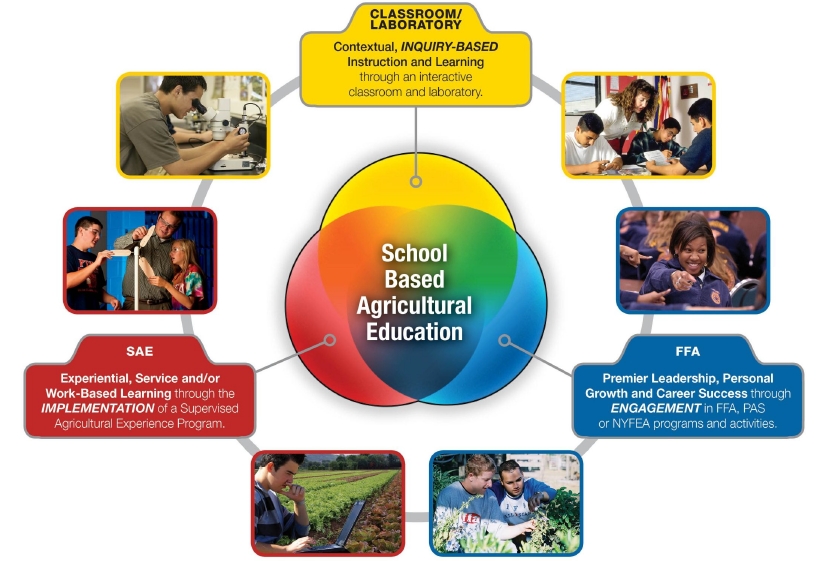Why Choose Agriscience Education?
Agriscience education teaches students about agriculture, food and natural resources. Through these subjects, agricultural educators teach students a wide variety of skills, including science, math, communications, leadership, management and technology.
The Shortage In Ag Ed
Currently there is a national shortage of agricultural educators at the secondary level. It is estimated that there will be hundreds of unfilled positions across the United States this year, simply because not enough students are choosing to be agricultural educators. Several of those jobs will be right here in Alabama.
Ag Ed Model
Agricultural Education uses a three-circle model of instruction:
1.) Classroom and laboratory instruction
2.) Leadership development
3.) Experiential learning.
The successful integration of each of these three components results in a strong program that produces well rounded individuals who are prepared to be leaders in agriculture, business, and industry.

Life As An Ag Teacher
As an Ag Teacher, you never experience the same day twice! You'll get to...
- Teach in a variety of settings
- Teach by doing, not just telling
- Share your passion for agriculture
- Create lessons that are hands-on
- Reach students, including those who might not be successful in a traditional classroom
- Teach about cutting edge topics, like cloning, satellite mapping, biofuels, alternative energy and more
- Travel in state, nationally, and even internationally
- Work with new and emerging technology from agribusiness companies
Agricultural educators are often on extended contracts, which means they get paid during the summer months and have the potential to earn a significantly higher salary than other teachers. For those not on extended contracts in Alabama, there is an opportunity for summer funding through a grant process (Request for Proposal) through the Alabama State Department of Education.
Competitive Salary and Benefits
Pay for teachers is very competitive in Alabama. The salary range for teachers in Alabama is $36,867 to $79,632; depending on salary, degree and contract length. Every school system sets their contract length for agriscience teachers. They range from 9 months (187 days) to 12 months (240 days).
Click here for the complete minimum salary schedule.
Blue Cross Blue Shield Health Insurance is available for teachers for a starting cost of $15/month for single coverage and $177/month for family coverage. Click here for more information.
Alabama also has a great teacher retirement system (TRS). Click here for more information.
You Can Make A Difference
Agriscience teachers have a unique opportunity to teach agriculture to students in an exciting activity-based setting that is centered on the development of the learner. By teaching agriculture you get the chance to convey the importance of agriculture to students and communities, and open doors of opportunity for your students.
Potential Careers With asn Agricultural Education Degree:
High School Agriscience Teacher
Agricultural Salesman
Agricultural Finance
Forestry Commission-Forester
Various Poultry Job Opportunities
USDA-Various
Store Manager-Various Agricultural Companies
And many others…..

Students
If you would like to receive more information about opportunities in agriscience education, please complete the following form. If you are currently enrolled in a community college and plan to major in agriscience education, please complete the following form.
Many students graduating from high schools choose to attend one of Alabama’s many community colleges to start their coursework toward their degree in agriscience education. Some students find it easier to transfer into Auburn University from a community college than to go through the more rigorous process of being accepted at Auburn University as an incoming freshman. As long as students maintain a 2.5 GPA in the community college coursework, the transfer process into agriscience education at Auburn University is relatively simple.
If you attend a community college first, one necessary part of that process is to utilize the STARS program to make sure that all of your community college courses will be accepted by Auburn University once you transfer. For more information on the STARS program, please click here.
Another important step is for you to make sure Auburn University knows you are in the pipeline for agriscience education so they can better gauge supply and demand for agriscience education in Alabama. Please fill out the information form so that you can be counted in those that are “Tagged to Teach Ag” in Alabama.

